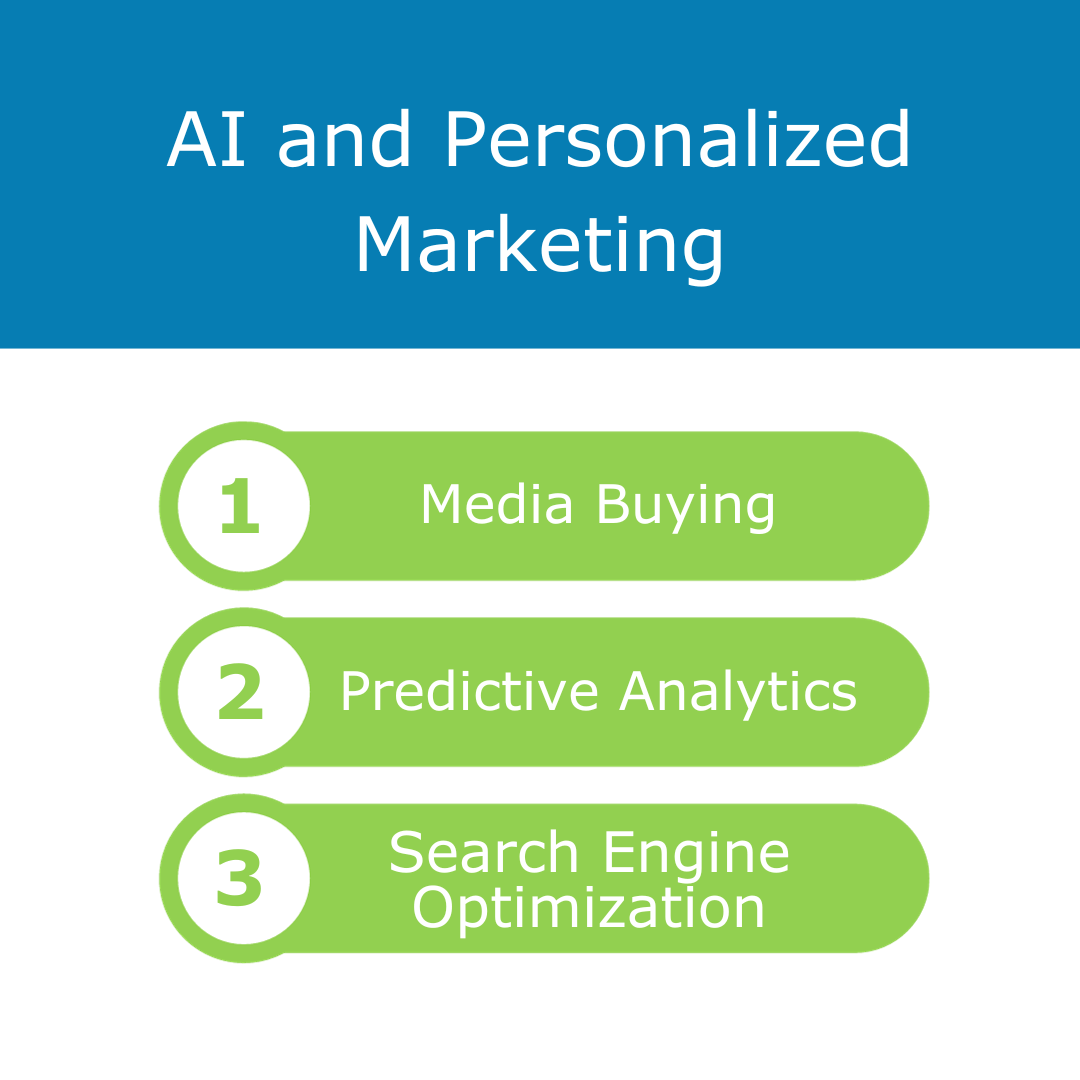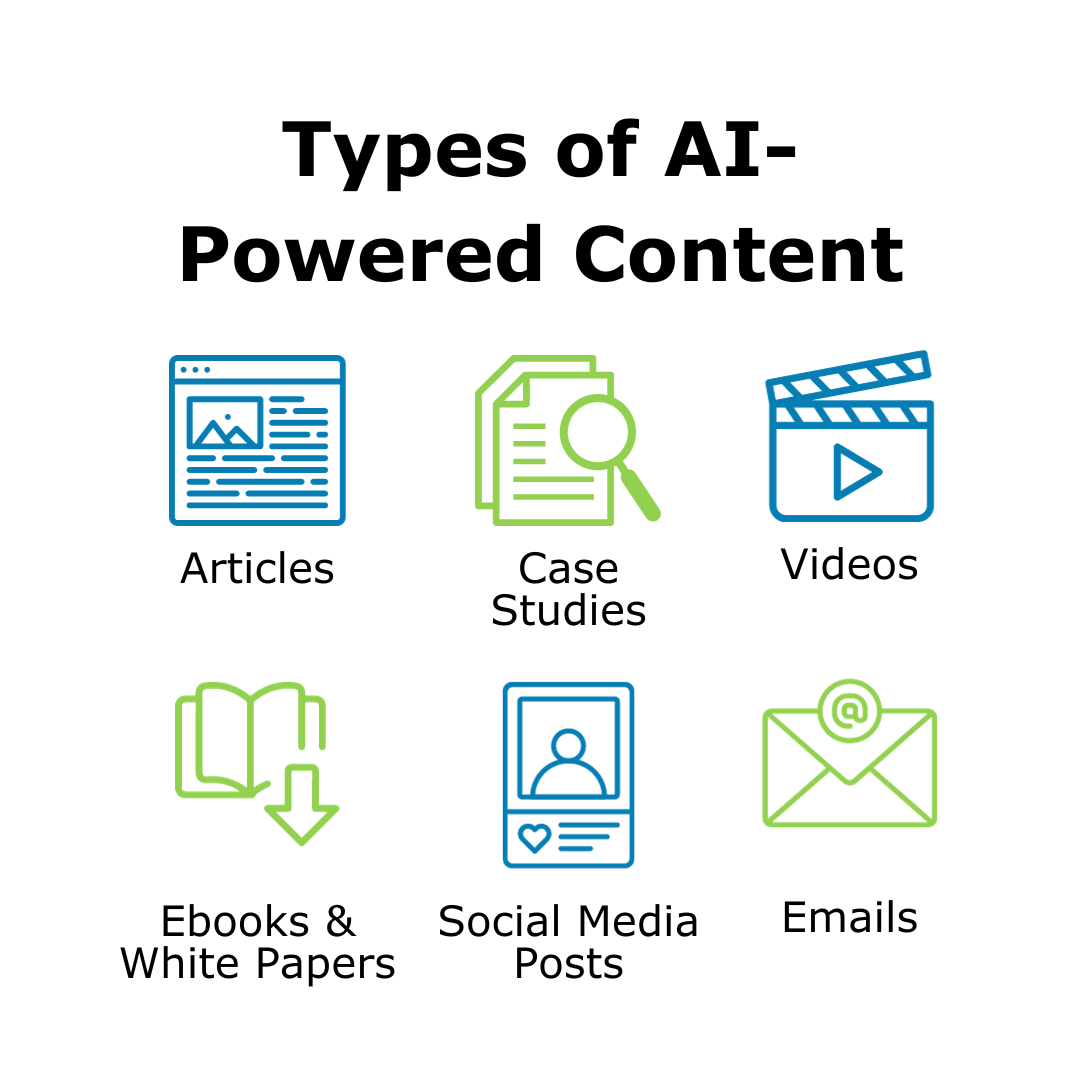Artificial Intelligence (AI) has become an essential tool in marketing. It offers deep insights, identifies early trends, and facilitates personalized audience engagement.
Businesses that incorporate AI into their marketing strategy can not only streamline their campaigns but also gain a competitive advantage.
In this article, we’ll delve into the role of AI in pharma marketing and how you can use it to attract more clients.
The Uses of AI in Pharma Marketing
Some businesses make mistakes when marketing to pharma companies, like not creating persona-based content or failing to measure key performance indicators (KPIs).
Ignoring the power of AI is another mistake made by many companies who offer services to Pharmaceutical and Biotech companies.
Not only can you use AI to accelerate your marketing efforts, you can use it to evaluate your own use of AI.
The array of applications for AI in marketing to pharma is virtually unlimited, but we’ll take a look at a few ways artificial intelligence can help you launch better marketing campaigns faster than ever.
Personalized Marketing Campaigns
With AI, you can quickly identify the interests and preferences of your potential clients.
Advanced algorithms dive into datasets and segment customers based on specific qualities like age, gender, and buying habits. This level of customer segmentation keeps your marketing efforts targeted to varied buyer personas.
For instance, if a pharma company is focused on biologics development, AI tools can detect this by analyzing trends in their recent publications, patents, and clinical trials.
With this knowledge, you can tailor your campaigns to emphasize how your products support commercializing biologics.
You can also use AI to evaluate social media content published by the key stakeholders at companies whose business you’d like to win.
This strategy allows you to quickly and deeply understand their pain points and needs so you can create messaging that resonates with them.
You can even go a step further and use AI to create your own social content that directly addresses your target audience’s pain points, positioning you as the go-to authority.
Media Buying
Effective marketing combines owned, earned, and paid media to create a holistic and impactful strategy.
Paid media in particular is now easier to use thanks to a process called programmatic advertising.
At its core, programmatic advertising automates the decision-making process when buying ad space online. This is done by targeting specific audiences and demographics in real time.
Programmatic advertising “analyzes many user signals to ensure that ads serve the right person, in the right place, at the right time,” writes Brooke Osmundson, Search Engine Journal.
AI helps pinpoint optimal ad placements and adjusts your bidding strategies to maximize ROI.
By fusing AI with automation, programmatic advertising allows you to run cost-effective campaigns with much more impact than previously possible with media buying alone.
Predictive Analytics
Predictive analytics, a subset of data analytics that focuses on forecasting future trends, can be amplified through the use of AI.
Advanced algorithms can project potential outcomes and give your businesses a clear vision of what’s ahead.
For instance, if you offer technology solutions to pharma companies, predictive analytics can identify when an ideal prospective client is gearing up to change vendors based on its past activities or acquisitions.
You can then adjust your marketing strategy, anticipate their needs and position your brand as the solution they need.
Search Engine Optimization
Search Engine Optimization (SEO) requires quick adjustments to changing trends.
AI excels in this aspect by monitoring search patterns and recommending timely changes to your content.
AI can also analyze search data to understand the terms your prospective clients are using to find solutions to their most pressing challenges.
Some AI tools even have semantic search capabilities that help you understand the real intent of search queries.
Creating valuable content based on AI-driven data and your own user insights maintains your visibility in search results and puts you front and center as a preferred choice.
That said, SEO is only effective depending on the quality and types of marketing content you publish. The good news is AI can now aid in the content creation process.
AI-Powered Content Marketing
There are many benefits of content marketing for reaching prospective pharma clients. Coupled with AI, these benefits are magnified.
AI-driven content marketing tools can analyze vast amounts of data to discern patterns that human eyes might miss.
This means content can be better targeted and adjusted in real time based on the shifting needs of your audience.
But to capitalize on these AI-driven insights, it is crucial to know which types of content will work best for your marketing strategy.
Articles
Articles remain a staple in content marketing. They serve as insightful resources and a way for your brand to establish its authority.
Most articles will accumulate results over time if they are written as evergreen content. You can even repurpose them into other content such as social media posts or e-books.
Before AI writing tools, creating articles relied on manual research, writing, and publishing. AI accelerates this process by sifting through data and finding the most relevant topics for your target audience.
It can also assist in optimizing the structure, tone, and clarity of your articles so they resonate with readers.
Using machine learning, articles can be updated based on user feedback and engagement patterns. As a result, your content stays current with industry trends without requiring manual updates.
Keep in mind that using AI to create marketing content might result in inaccurate information or factual errors. So it’s still ideal to review your AI-generated articles before publishing.
Case Studies
Pharma clients often face complex challenges. Through detailed case studies illustrating previous wins, your prospective clients can more easily picture themselves experiencing their desired results.
More importantly, they will understand how your solutions can be applied to their specific needs. Case studies, after all, are proof of your expertise, methodology, and the tangible results you deliver.
If that’s not enough, a study by the Content Marketing Institute found that 73% of successful marketers use case studies in their strategy.
While case studies undoubtedly offer value, integrating AI tools can elevate their impact. For instance, AI can identify key trends, statistics, and patterns to enrich the narrative.
This data-backed approach ensures that the information presented is both comprehensive and relevant.
You can also train AI tools in the tone, style, and flow of your writing to more quickly produce copy that resonates with your audience.
In the decision-making journey, pharma clients seek assurance of the value and results they'll receive. A well-researched and AI-augmented case study acts as a powerful tool for this goal.
It shows past successes and nudges prospective clients from consideration to active conversion.
Videos
Videos are rising in popularity across demographics to access information. Given their visual and easy-to-digest quality, it’s not surprising that 91% of businesses use video as a marketing tool.
Video content is easily shareable across different platforms like websites and social media. When done strategically, it can increase your exposure and build trust with potential clients.
However, producing high-quality video content often requires substantial investment.
Emerging AI tools can mitigate this problem. Automated video editing tools now exist that can cut, trim, and piece together video clips based on predefined criteria.
Advanced AI can also generate human-like voiceovers to eliminate the need for manual recording.
Once the video is posted, AI tools can analyze viewer engagement metrics so you adjust your strategy accordingly.
And we’re in the early days of what AI can do for video marketing.
Ebooks and White Papers
Unlike short-form content, ebooks and white papers allow for a longer exploration of topics. They are especially valuable in pharma content marketing where the target audience values precision and depth of knowledge.
You can use these types of content to educate potential clients on your research and expertise. A well-researched document can position your business as an industry leader and set you apart from competitors.
With the integration of AI, you further improve the lead generation potential of your informational content.
It analyzes reader behavior and preferences so you can create personalized follow-ups and content recommendations.
Predictive analytics powered by AI can also identify potential leads based on their interaction with the content. This helps create a more targeted outreach strategy.
And, of course, synthesizing multiple sources, writing coherent content, and even formatting your white paper or ebook is all now much faster with the right AI tool.
Social Media Posts
There are 4.59 billion people who use social media worldwide. For businesses targeting the pharmaceutical sector, this number is too significant to overlook.
Platforms like LinkedIn and Twitter are useful for sharing relevant articles and research insights since they cater to a professional and informed audience actively seeking industry-related content.
Facebook and Instagram, with their vast user base, are ideal for broader outreach campaigns or to build brand awareness.
Using AI tools can elevate the reach and relevance of these posts.
For instance, if you post a research article on LinkedIn, AI analytics can identify which audience segment engaged the most – from research scientists to C-level executives and pharma sales professionals.
Beyond audience segmentation, AI can offer suggestions for content enhancements, keywords, or hashtags to increase visibility.
It also helps pinpoint the best times for posting so your content reaches the maximum number of potential clients. Through advanced analytics, you can discern emerging trends and preferences within your audience's conversations.
Post-publishing, AI tools offer metrics for each campaign, such as user engagement, sharing patterns, and overall reach.
With these data-driven insights, you can refine your future marketing strategies and allocate resources effectively.
Emails
One strength of emails is the adaptability of their content. While newsletters keep subscribers updated about the latest industry trends, drip campaigns nurture potential leads by providing a series of valuable insights or offers.
Emails don’t offer the same broad audience reach as social media posts, but they excel in delivering targeted and direct communication to niche users.
In fact, 64% of B2B marketers say their email marketing strategy effectively met business goals.
Prior to AI, traditional marketing campaigns faced the challenge of identifying when to send email content.
AI can predict the best times to send emails to each user based on their past interactions. AI-driven A/B testing tools can also evaluate various email components – from subject lines to call-to-action buttons – to determine what drives the best results.
Email automation workflows previously followed a linear path. For example: 'If user does X, then send email Y.'
With AI, these workflows can become more complex and adaptive, adjusting the path in real time based on user behavior. Each user gets the most relevant content at each stage of their buyer journey.
If users unsubscribe to your emails, AI can offer them content or frequency preferences instead of a complete opt-out, which helps retain more subscribers in the long run.
Best of all, AI continually learns. As users engage (or don't engage) with automated emails, the AI system processes this feedback to refine future campaigns.
Embracing AI as the Future of Pharma Marketing
AI offers unparalleled advantages – from crafting personalized content to making predictive analyses that can shape future campaigns.
By integrating AI into your marketing, you’ll not only avoid common pitfalls but also unlock new opportunities for business growth.
Embracing AI is now a necessity if you want to stay ahead of your competition and reach prospective pharma clients.
Ready to start? Contact us today to learn how you can start using AI in your marketing efforts.




